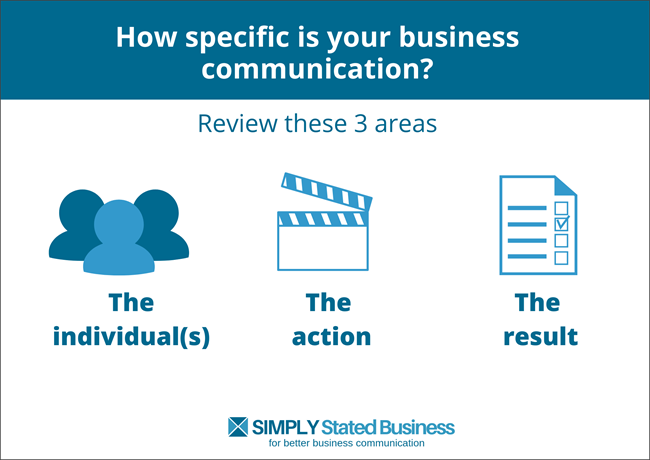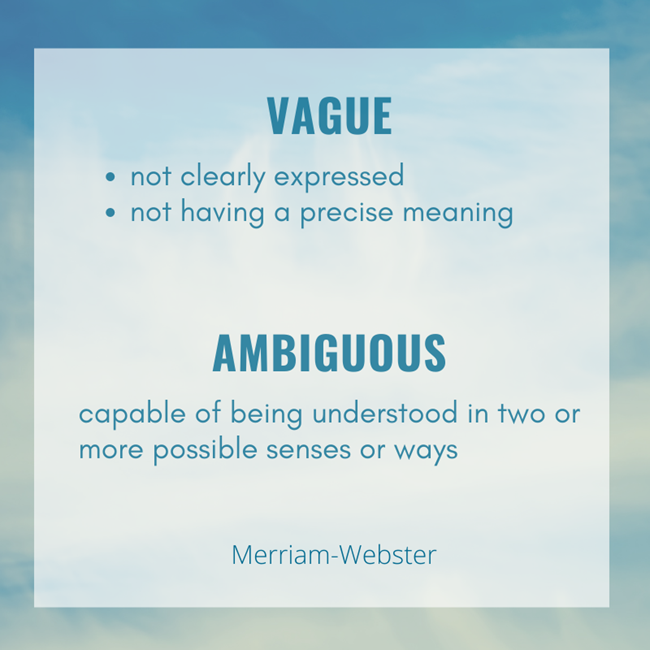 What picture do you see in your mind when you read the following?
What picture do you see in your mind when you read the following?
Marcus ran into Tim in the hallway.
- Did you think Marcus owed Tim an apology because he bumped into Tim?
- Or did you think Marcus simply encountered Tim while walking down the hallway?
Let’s rewrite the above sentence.
Running down the hallway, Marcus plowed into Tim.
Did your mental picture change?
The secret to understanding the written or spoken word is: be specific.
The following shares examples for creating more specific language and free word lists for downloading.
How Specific is Your Business Communication?
Non-specific business communication leads to different interpretations. The result could be embarrassing, annoying, or costly. Or all three.
Example
Recently, my mom turned 100 years old. Surreal, right?
- Mom sees her hairdresser every other week. Mom just had her appointment.
- But her hairdresser offered an appointment for the next week (for Mom’s birthday).
Upon leaving her birthday appointment, I confirmed we’d be back on mom’s regular schedule. One problem. That meant something different to me than it did to the hairdresser.
- For me, that meant the previously scheduled appointment for the next week.
- The hairdresser viewed it as two weeks from the birthday appointment.
As a result, the scheduled every-other-week appointments had to be completely redone.
So, how can you be more specific? Review your business communication content for non-specific words. Keeping it simple, examine three specific 😉 areas (as illustrated below).

Specific Individual(s)
When referring to an individual or groups of people, it is easy to stumble into an unclear meaning. Search for vague or ambiguous writing. What does that mean?
Our friends at Merriam-Webster offer the following definitions.

- To help you out, download this list of vague or ambiguous words with suggested alternatives.
- You can also download the list of Power Words to create stronger writing.
Examples
When Marcus saw Tim in the hallway, he stopped him to ask a question.
- Who stopped to ask a question?
- Marcus? Tim?
Alternative
Marcus stopped Tim in the hallway to ask him a question.
Action
The words you choose to denote an action can also prompt different meanings. Consider the following example.
Example
The committee recognized XYZ Company’s contribution to the community.
What does recognized mean in this context?
- Discussed or noticed the company’s contribution?
- Rewarded or praised the company?
Alternative
The committee recognized XYZ Company’s contribution by awarding the company with the city’s Outstanding Community Supporter Award.
Result
My mom’s hair appointment is an example of a non-specific reference causing an unwelcome result.
- Mom and I showed up the next week. We sat in the car as we could see the hairdresser had someone at her station.
- After 15minutes of waiting, I went inside to see how much longer it was going to be.
- That’s when we discovered my misunderstanding of the date and time.
Specific Alternative
If either Mom’s hairdresser or I used the specific date for the next appointment, the understanding would have been clear to both of us.
So, Mom’s next appointment is MM/DD at 9:30 AM.
Another tip
The point is not about determining who is right or wrong. The point is about creating better business communication.
The Specific Secret
Like most principles in writing, the Specific Secret is flexible. Words like some, may, very, and most have their place. Consider the following when choosing your words.
- Type of content – For example, blog content uses a more relaxed style than an Executive Summary.
- The tone – Vague words soften a tone. Instead of: John caused the problem. Substitute: Let’s review the results to see if we may have miscalculated.
- When it doesn’t matter – Sometimes you don’t know the specifics and it wouldn’t add much if you did. Do you really need to know that Kylie Jenner has 381.6 million Instagram followers rather than 382 million?
On the Other Hand
Being specific adds clarity, credibility, and boosts understanding. Specifics also make words more interesting and vivid.
If you know an approximate number and not the specific, use the approximate – Over 300 million packs more punch than a lot or a whole bunch.
(Note: If you’re writing scientific or medical content, the approximate does not work. We humans don’t like our scientists and medical personnel fudging).
On Point
Next time you’re editing your business communication, ask yourself – How can I be more specific? The secret is knowing when it matters.
What specific comments do you have? (Yes, shameless puns abound). Share your thoughts in the Comments section.
==================================
Helping you keep your business communication simple, clear, and uniquely yours.
==================================

Thanks, Cathy. I’ve been practicing! I’m not always clear and it causes unnecessary grief and back-and-forth with clients.
My biggest challenge is the “wall of text”. Since I’m in a technical field, I feel like I have to outline / explain everything. The trick is knowing when to summarize and when to get into the weeds.
Cheers,
Mitch
I suspect you’re better than most, Mitch. I definitely write better than I talk. I tend to ramble when I’m chatting. I need lots of practice. 🙂 Thanks for sharing your perspective, Mitch.